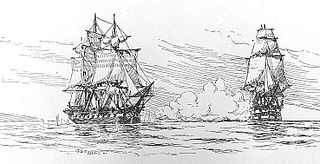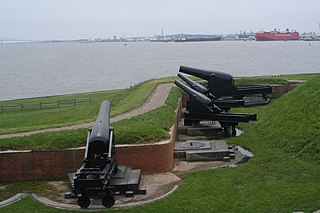 W
WThe War of 1812 was a conflict fought between the United States and its allies, and the United Kingdom of Great Britain and Ireland and its allies. It began when the United States declared war in June 1812 and ended in a stalemate when a peace treaty agreed to earlier was ratified by the United States in February 1815. While the war ended in a draw, both sides were happy with the outcome as the war ended, although indigenous nations are generally seen among historians as the real losers. Historians in Britain often see it as a minor theatre of the Napoleonic Wars while historians in North America see it as a war in its own right. From the outbreak of war with Napoleonic France in 1803, Britain had enforced a naval blockade to choke off neutral trade to France, which the United States contested as illegal under international law. To man the blockade, Britain pressed merchant sailors into the Royal Navy, including Americans. American sentiment grew increasingly hostile toward Britain due to incidents such as the 1807 Chesapeake–Leopard affair. The British were similarly outraged by the 1811 Little Belt affair, in which eleven British sailors died. Britain supplied arms to Native Americans, who raided European-American settlers on the American frontier, hindering the expansion of the United States and provoking resentment. Although the debate on whether the desire to annex some or all of British North America (Canada) contributed to the American decision to go to war, the reasoning for invasion was mainly strategical. President James Madison signed into law the declaration of war after heavy pressure from the War Hawks in the United States Congress.
 W
WAnglo-American Peace Centenary (1814–1914) was in 1914 to celebrate the lasting peace between Britain and the United States. They last fought in the War of 1812, and those hostilities were ended formally on December 24, 1814, with the signing of the Treaty of Ghent.
 W
WDominic A. Hall and Louis Louaillier were American political figures who were ordered detained during the War of 1812 under the order of Major General Andrew Jackson in 1815. Hall later put Jackson under investigation and oversaw the trial that led to Jackson being fined.
 W
WThe Chesapeake–Leopard affair was a naval engagement that occurred off the coast of Norfolk, Virginia, on Monday, June 22, 1807, between the British warship HMS Leopard and the American frigate USS Chesapeake. The crew of Leopard pursued, attacked, and boarded the American frigate, looking for deserters from the Royal Navy. Chesapeake was caught unprepared and after a short battle involving broadsides received from Leopard, the commander of Chesapeake, James Barron, surrendered his vessel to the British. Chesapeake had fired only one shot.
 W
WThe Creek War (1813–1814), also known as the Red Stick War and the Creek Civil War, was a regional war between opposing Creek factions, European empires and the United States, taking place largely in today's Alabama and along the Gulf Coast. The major conflicts of the war took place between state militia units and the "Red Stick" Creeks.
 W
WFlotilla Service Act was a United States federal statute passed on April 16, 1814 preceding the British Royal Navy blockade of the New England Colonies commencing on April 25, 1814. The public law established a temporary Mid-Atlantic naval auxiliary service for amphibious operations orchestrated by the Chesapeake Colonies during the War of 1812. The Chesapeake Bay Flotilla conducted amphibious maneuvers in low-level tidal creeks seeking to deter the territorial headway of the British Royal Navy offensive into the Chesapeake Bay tributaries. The Act of Congress authorized appropriations for the federal law in response to the foreseeable onslaught by the British Army redcoats arson offensive on August 24, 1814 at Washington City better known as the Burning of Washington.
 W
WThe Treaty of Greenville (1814) was called A treaty of peace and friendship between the United States of America and the tribes of Native Americans called the Wyandots, Delawares, Shawanoese, Senacas and Miamies. It was concluded at Greenville, Ohio on July 22, 1814, to provide peace among the tribes, and with the U.S., as well as an alliance between these Tribes and the U.S. against Great Britain during the War of 1812.
 W
WThe model 1805 U.S. Marshal "Harper's Ferry" flintlock pistol, manufactured at the Harpers Ferry Armory in Virginia, was the first pistol manufactured by an American national armory. It was the standard handgun of the US dragoons during the War of 1812.
 W
WImpressment, colloquially "the press" or the "press gang", is the taking of men into a military or naval force by compulsion, with or without notice. European navies of several nations used forced recruitment by various means. The large size of the British Royal Navy in the Age of Sail meant impressment was most commonly associated with Great Britain and Ireland. It was used by the Royal Navy in wartime, beginning in 1664 and during the 18th and early 19th centuries as a means of crewing warships, although legal sanction for the practice can be traced back to the time of Edward I of England. The Royal Navy impressed many merchant sailors, as well as some sailors from other, mostly European, nations. People liable to impressment were "eligible men of seafaring habits between the ages of 18 and 55 years". Non-seamen were sometimes impressed as well, though rarely.
 W
WThe Little Belt affair was a naval battle on the night of 16 May 1811. It involved the United States frigate USS President and the British sixth-rate HMS Little Belt, a sloop-of-war, which had originally been the Danish ship Lillebælt, before being captured by the British in the 1807 Battle of Copenhagen. The encounter took place off the North Carolina coast. The Little Belt Affair was one of many incidents and events that led to the War of 1812.
 W
WMiddle Sister Island is a 9.5-acre (3.8 ha) island in Lake Erie. Along with West Sister Island and East Sister Island, it is part of the Pelee Archipelago in the western basin of Lake Erie, and is considered to be the "most natural and undisturbed" of these islands.
 W
WOpposition to the War of 1812 was widespread in the United States, especially in New England. Many New Englanders opposed the conflict on political, economic, and religious grounds. When the Embargo Act of 1807 failed to remedy the situation with the United Kingdom, with Britain refusing to rescind the Orders in Council (1807) and the French continuing their decrees, certain Democratic-Republicans known as war hawks felt compelled to persuade the United States government to declare war on the British. A number of contemporaries called it, "The second war for independence." Henry Clay and John Calhoun pushed a declaration of war through Congress, stressing the need to uphold American honor and independence. Speaking of the impact of the depressed cotton trade upon his fellow Southerners, Calhoun told Congress that:They see, in the low price of their produce, the hand of foreign injustice; they know well without the market to the continent, the deep and steady current of supply will glut that of Great Britain; they are not prepared for the colonial state to which again that Power [Great Britain] is endeavoring to reduce us. The manly spirit of that section of our country will not submit to be regulated by any foreign Power.
 W
WThe presidency of James Madison began on March 4, 1809, when James Madison was inaugurated as President of the United States, and ended on March 4, 1817. Madison, the fourth United States president, took office after defeating Federalist Charles Cotesworth Pinckney decisively in the 1808 presidential election. He was re-elected four years later, defeating DeWitt Clinton in the 1812 election. His presidency was dominated by the War of 1812 with Britain. Madison was succeeded by Secretary of State James Monroe, a fellow member of the Democratic-Republican Party.
 W
WThe Battles of Frenchtown, also known as the Battle of the River Raisin and the River Raisin Massacre, was a series of conflicts in Michigan Territory that took place from January 18–23, 1813, during the War of 1812. It was fought between the United States and a British and Native American alliance near the River Raisin in Frenchtown,.
 W
WThe Rush–Bagot Treaty or Rush–Bagot Disarmament was a treaty between the United States and Great Britain limiting naval armaments on the Great Lakes and Lake Champlain, following the War of 1812. It was ratified by the United States Senate on April 16, 1818, and was confirmed by Canada, following Confederation in 1867.
 W
WSeacoast defense was a major concern for the United States from its independence until World War II. Before airplanes, many of America's enemies could only reach it from the sea, making coastal forts an economical alternative to standing armies or a large navy. After the 1940s, it was recognized that fixed fortifications were obsolete and ineffective against aircraft and missiles. However, in prior eras foreign fleets were a realistic threat, and substantial fortifications were built at key locations, especially protecting major harbors.
 W
WThe Star-Spangled Banner, or the Great Garrison Flag, was the garrison flag that flew over Fort McHenry in Baltimore Harbor during the naval portion of the Battle of Baltimore during the War of 1812. It is on exhibit at the National Museum of American History, Smithsonian Institution. Seeing the flag flying over Fort McHenry on the morning of September 14, 1814, after the battle ended, Francis Scott Key was inspired to write the poem "Defence of Fort M'Henry". These words were written by Key and set to the tune of "To Anacreon in Heaven" by John Stafford Smith, a popular song at the time. It was not until 1931 that the song became the national anthem of the United States.
 W
WTecumseh's War or Tecumseh's Rebellion was a conflict between the United States and Tecumseh's Confederacy, led by the Shawnee leader Tecumseh in the Indiana Territory. Although the war is often considered to have climaxed with William Henry Harrison's victory at the Battle of Tippecanoe in 1811, Tecumseh's War essentially continued into the War of 1812 and is frequently considered a part of that larger struggle. The war lasted for two more years, until 1813, when Tecumseh and his second-in-command, Roundhead, died fighting Harrison's Army of the Northwest at the Battle of the Thames in Upper Canada, near present-day Chatham, Ontario, and his confederacy disintegrated. Tecumseh's War is viewed by some academic historians as the final conflict of a longer-term military struggle for control of the Great Lakes region of North America, encompassing a number of wars over several generations, referred to as the Sixty Years' War.
 W
WThe Treaty of Ghent was the peace treaty that ended the War of 1812 between the United States and Great Britain. It took effect in February 1815. Both sides signed it on December 24, 1814, in the city of Ghent, United Netherlands. The treaty restored relations between the two parties to status quo ante bellum by restoring the prewar borders of June 1812.
 W
WAn Act Declaring War between the United Kingdom of Great Britain and Ireland and the Dependencies Thereof and the United States of America and Their Territories was passed by the 12th United States Congress on June 18, 1812, thereby beginning the War of 1812. It was signed by James Madison, the 4th President of the United States.
 W
WThe Washington Blues were a company of Maryland Volunteers which saw action during the Battle of Bladensburg and the Battle of North Point, during the War of 1812.